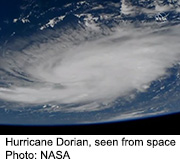- Could Your Grocery Store Meat Be Causing Recurring UTIs?
- Are You Making This Expensive Thermostat Error This Winter?
- Recognizing the Signs of Hypothyroidism
- 10 Strategies to Overcome Insomnia
- Could Artificial Sweeteners Be Aging the Brain Faster?
- Techniques for Soothing Your Nervous System
- Does the Water in Your House Smell Funny? Here’s Why
- Can a Daily Dose of Apple Cider Vinegar Actually Aid Weight Loss?
- 6 Health Beverages That Can Actually Spike Your Blood Sugar
- Treatment Options for Social Anxiety Disorder
Many Older Americans Aren’t Equipped to Weather Hurricanes Like Dorian

As Hurricane Dorian continues to churn up the east coast of Florida, a new poll shows that many older Americans aren’t fully prepared to cope with natural disasters or severe storms.
The poll of more than 2,200 adults, ages 50 to 80, found that less than one-third have an emergency kit with essential supplies and medicines that can sustain them at home or that they can take with them in an evacuation, and only one-quarter who rely on electrical power to run health-related equipment have a backup power supply.
Less than half have signed up for emergency warning systems offered by their community, which can provide crucial information in a crisis, according to the National Poll on Healthy Aging by the Institute Healthcare Policy and Innovation at the University of Michigan.
“Whether it’s as straightforward as a power outage that lasts a day, or as severe as a hurricane, tornado or earthquake, preparing can make a huge difference,” said poll director Dr. Preeti Malani, a professor in the university’s medical school.
“A bit of time spent now can protect your health, and spare you worry and expense, when something like this does happen,” Malani added in a university news release.
Yet only 40% of respondents have spoken with loved ones about what to do in different types of emergency situations.
The poll did find that 82% of respondents said they have a week’s supply of their medications and 72% said they have a week’s worth of other health supplies. A week’s supply is the minimum recommend by experts.
Just over half said they had the recommended week’s worth of food and water, while fewer had cellphone chargers and radios that didn’t require electricity.
Nearly all the respondents said they had transportation if they needed to evacuate their homes, but 1 in 4 said it would be difficult for them to pay for a place to stay for a week.
“The results of this poll can be used to target efforts to better support older adults to prepare for an emergency,” said Sue Anne Bell, a University of Michigan School of Nursing researcher who studies the health implications of major emergencies and disasters.
“By knowing areas where older adults are well-prepared, and where they are not, programs can work alongside older adults to become fully prepared and ready,” Bell explained.
More information
The U.S. Centers for Disease Control and Prevention has more on disaster preparedness and recovery.
Source: HealthDay
Copyright © 2026 HealthDay. All rights reserved.










